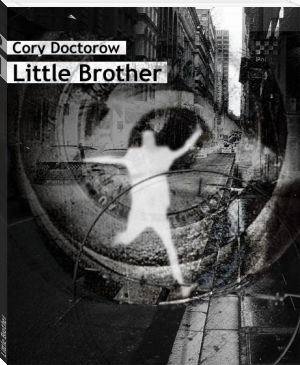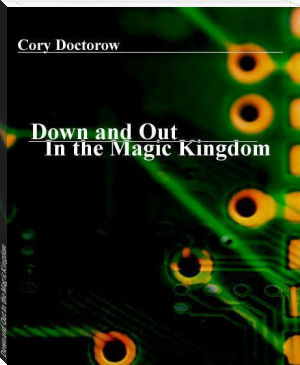Little Brother - Cory Doctorow (book recommendations website txt) 📗

- Author: Cory Doctorow
Book online «Little Brother - Cory Doctorow (book recommendations website txt) 📗». Author Cory Doctorow
Charles put his hand up. "Shouting fire in a crowded theater?"
"Very good --" she consulted the seating plan -- "Charles. There are many instances in which the First Amendment is not absolute. Let's list some more of those."
Charles put his hand up again. "Endangering a law enforcement officer."
"Yes, disclosing the identity of an undercover policeman or intelligence officer. Very good." She wrote it down. "Others?"
"National security," Charles said, not waiting for her to call on him again. "Libel. Obscenity. Corruption of minors. Child porn. Bomb-making recipes." Mrs Andersen wrote these down fast, but stopped at child porn. "Child porn is just a form of obscenity."
I was feeling sick. This was not what I'd learned or believed about my country. I put my hand up.
"Yes, Marcus?"
"I don't get it. You're making it sound like the Bill of Rights is optional. It's the Constitution. We're supposed to follow it absolutely."
"That's a common oversimplification," she said, giving me a fake smile. "But the fact of the matter is that the framers of the Constitution intended it to be a living document that was revised over time. They understood that the Republic wouldn't be able to last forever if the government of the day couldn't govern according to the needs of the day. They never intended the Constitution to be looked on like religious doctrine. After all, they came here fleeing religious doctrine."
I shook my head. "What? No. They were merchants and artisans who were loyal to the King until he instituted policies that were against their interests and enforced them brutally. The religious refugees were way earlier."
"Some of the Framers were descended from religious refugees," she said.
"And the Bill of Rights isn't supposed to be something you pick and choose from. What the Framers hated was tyranny. That's what the Bill of Rights is supposed to prevent. They were a revolutionary army and they wanted a set of principles that everyone could agree to. Life, liberty and the pursuit of happiness. The right of people to throw off their oppressors."
"Yes, yes," she said, waving at me. "They believed in the right of people to get rid of their Kings, but --" Charles was grinning and when she said that, he smiled even wider.
"They set out the Bill of Rights because they thought that having absolute rights was better than the risk that someone would take them away. Like the First Amendment: it's supposed to protect us by preventing the government from creating two kinds of speech, allowed speech and criminal speech. They didn't want to face the risk that some jerk would decide that the things that he found unpleasant were illegal."
She turned and wrote, "Life, liberty and the pursuit of happiness" on it.
"We're getting a little ahead of the lesson, but you seem like an advanced group." The others laughed at this, nervously.
"The role of government is to secure for citizens the rights of life, liberty and the pursuit of happiness. In that order. It's like a filter. If the government wants to do something that makes us a little unhappy, or takes away some of our liberty, it's OK, providing they're doing it to save our lives. That's why the cops can lock you up if they think you're a danger to yourself or others. You lose your liberty and happiness to protect life. If you've got life, you might get liberty and happiness later."
Some of the others had their hands up. "Doesn't that mean that they can do anything they want, if they say it's to stop someone from hurting us in the future?"
"Yeah," another kid said. "This sounds like you're saying that national security is more important than the Constitution."
I was so proud of my fellow students then. I said, "How can you protect freedom by suspending the Bill of Rights?"
She shook her head at us like we were being very stupid. "The 'revolutionary' founding fathers shot traitors
and spies. They didn't believe in absolute freedom, not when it threatened the Republic. Now you take these Xnet people --"
I tried hard not to stiffen.
"-- these so-called jammers who were on the news this morning. After this city was attacked by people who've declared war on this country, they set about sabotaging the security measures set up to catch the bad guys and prevent them from doing it again. They did this by endangering and inconveniencing their fellow citizens --"
"They did it to show that our rights were being taken away in the name of protecting them!" I said. OK, I shouted. God, she had me so steamed. "They did it because the government was treating everyone
like a suspected terrorist."
"So they wanted to prove that they shouldn't be treated like terrorists," Charles shouted back, "so they acted like terrorists? So they committed terrorism?"
I boiled.
"Oh for Christ's sake. Committed terrorism? They showed that universal surveillance was more dangerous than terrorism. Look at what happened in the park last weekend. Those people were dancing and listening to music. How is that
terrorism?"
The teacher crossed the room and stood before me, looming over me until I shut up. "Marcus, you seem to think that nothing has changed in this country. You need to understand that the bombing of the Bay Bridge changed everything. Thousands of our friends and relatives lie dead at the bottom of the Bay. This is a time for national unity in the face of the violent insult our country has suffered --"
I stood up. I'd had enough of this "everything has changed" crapola. "National unity? The whole point of America is that we're the country where dissent is welcome. We're a country of dissidents and fighters and university dropouts and free speech people."
I thought of Ms Galvez's last lesson and the thousands of Berkeley students who'd surrounded the police-van when they tried to arrest a guy for distributing civil rights literature. No one tried to stop those trucks when they drove away with all the people who'd been dancing in the park. I didn't try. I was running away.
Maybe everything had
changed.
"I believe you know where Mr Benson's office is," she said to me. "You are to present yourself to him immediately. I will not
have my classes disrupted by disrespectful behavior. For someone who claims to love freedom of speech, you're certainly willing to shout down anyone who disagrees with you."
I picked up my SchoolBook and my bag and stormed out. The door had a gas-lift, so it was impossible to slam, or I would have slammed it.
I went fast to Mr Benson's office. Cameras filmed me as I went. My gait was recorded. The arphids in my student ID broadcast my identity to sensors in the hallway. It was like being in jail.
"Close the door, Marcus," Mr Benson said. He turned his screen around so that I could see the video feed from the social studies classroom. He'd been watching.
"What do you have to say for yourself?"
"That wasn't teaching, it was propaganda
. She told us that the Constitution didn't matter!"
"No, she said it wasn't religious doctrine. And you attacked her like some kind of fundamentalist, proving her point. Marcus, you of all people should understand that everything changed when the bridge was bombed. Your friend Darryl --"
"Don't you say a goddamned word about him," I said, the anger bubbling over. "You're not fit to talk about him. Yeah, I understand that everything's different now. We used to be a free country. Now we're not."
"Marcus, do you know what 'zero-tolerance' means?"
I backed down. He could expel me for "threatening behavior." It was supposed to be used against gang kids who tried to intimidate their teachers. But of course he wouldn't have any compunctions about using it on me.
"Yes," I said. "I know what it means."
"I think you owe me an apology," he said.
I looked at him. He was barely suppressing his sadistic smile. A part of me wanted to grovel. It wanted to beg for his forgiveness for all my shame. I tamped that part down and decided that I would rather get kicked out than apologize.
"Governments are instituted among men, deriving their just powers from the consent of the governed, that whenever any form of government becomes destructive of these ends, it is the right of the people to alter or abolish it, and to institute new government, laying its foundation on such principles, and organizing its powers in such form, as to them shall seem most likely to effect their safety and happiness." I remembered it word for word.
He shook his head. "Remembering things isn't the same as understanding them, sonny." He bent over his computer and made some clicks. His printer purred. He handed me a sheet of warm Board letterhead that said I'd been suspended for two weeks.
"I'll email your parents now. If you are still on school property in thirty minutes, you'll be arrested for trespassing."
I looked at him.
"You don't want to declare war on me in my own school," he said. "You can't win that war. GO!"
I left.
CHAPTER 14
This chapter is dedicated to the incomparable Mysterious Galaxy in San Diego, California. The Mysterious Galaxy folks have had me in to sign books every time I've been in San Diego for a conference or to teach (the Clarion Writers' Workshop is based at San Diego State University in nearby La Jolla, CA), and every time I show up, they pack the house. This is a store with a loyal following of die-hard fans who know that they'll always be able to get great recommendations and great ideas at the store. In summer 2007, I took my writing class from Clarion down to the store for the midnight launch of the final Harry Potter book and I've never seen such a rollicking, awesomely fun party at a store.
[[Mysterious Galaxy http://mysteriousgalaxy.booksense.com/NASApp/store/Product?s=showproduct&isbn=9780765319852 7051 Clairemont Mesa Blvd., Suite #302 San Diego, CA USA 92111 +1 858 268 4747]]
The Xnet wasn't much fun in the middle of the school-day, when all the people who used it were in school. I had the piece of paper folded in the back pocket of my jeans, and I threw it on the kitchen table when I got home. I sat down in the living room and switched on the TV. I never watched it, but I knew that my parents did. The TV and the radio and the newspapers were where they got all their ideas about the world.
The news was terrible. There were so many reasons to be scared. American soldiers were dying all over the world. Not just soldiers, either. National guardsmen, who thought they were signing up to help rescue people from hurricanes, stationed overseas for years and years of a long and endless war.
I flipped around the 24-hour news networks, one after another, a parade of officials telling us why we should be scared. A parade of photos of bombs going off around the world.
I kept flipping and found myself looking at a familiar face. It was the guy who had come into the truck and spoken to Severe-Haircut woman when I was chained up in the back. Wearing a military uniform. The caption identified him as Major General Graeme Sutherland, Regional Commander, DHS.
"I hold in my hands actual literature on





Comments (0)